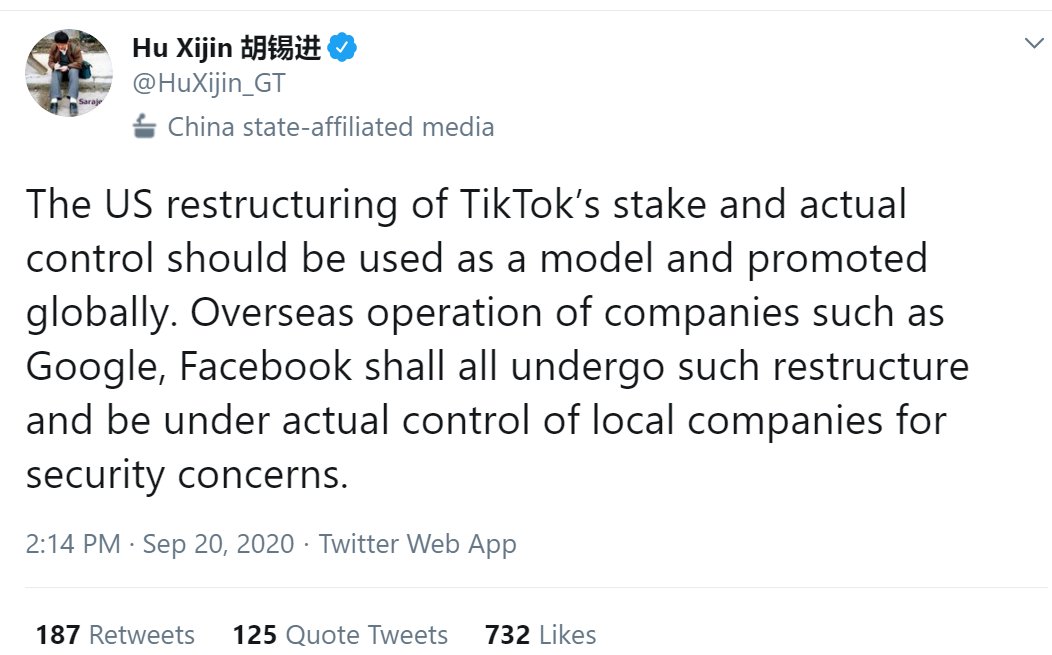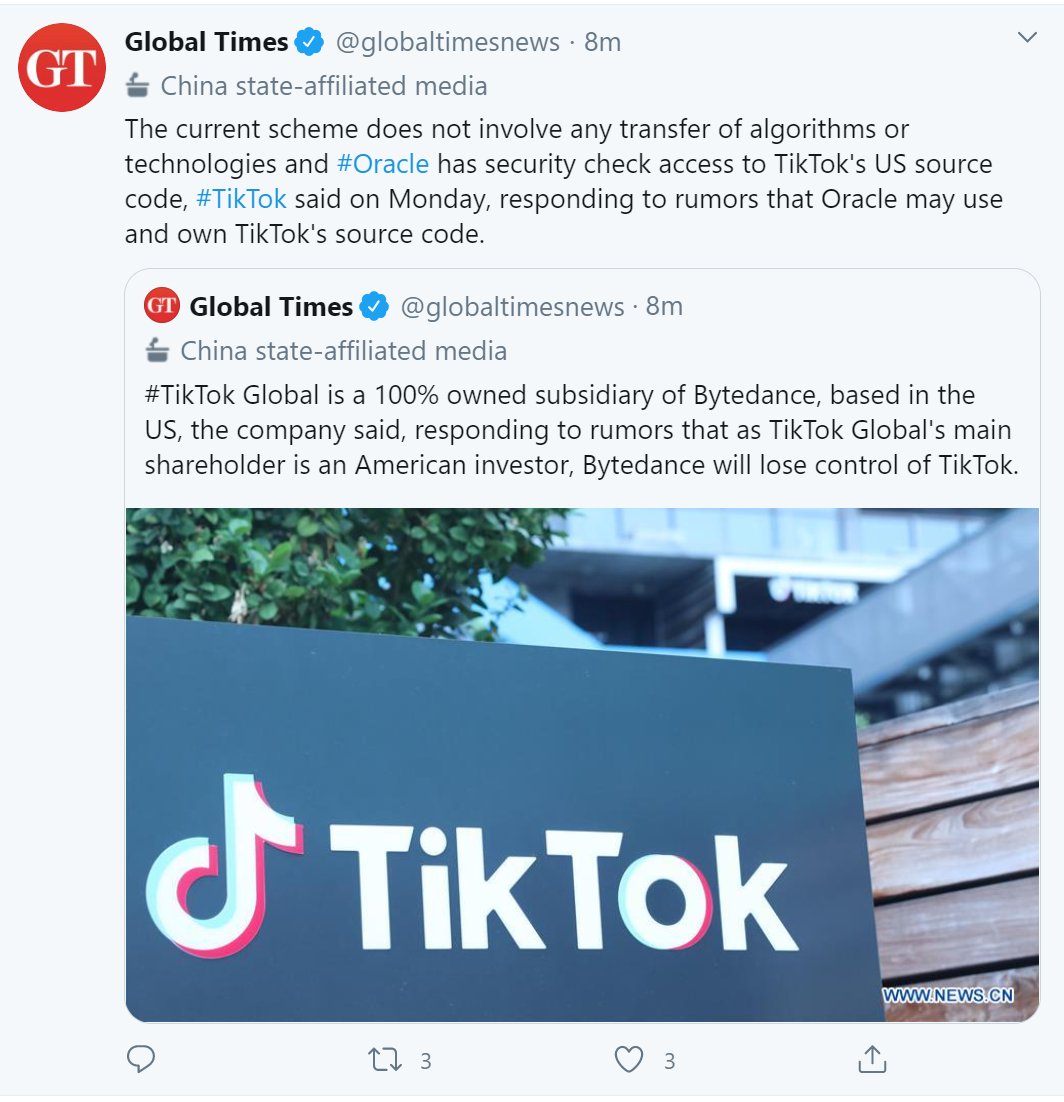
Beijing is making a concerted push to lead the Future Internet, across infrastructure, application, and governance domains.
It's time for democracies to push back.
In a new report, I detail this effort and provide 47 recs for the US, Europe, & allies.
securingdemocracy.gmfus.org/future-interne…
It's time for democracies to push back.
In a new report, I detail this effort and provide 47 recs for the US, Europe, & allies.
securingdemocracy.gmfus.org/future-interne…
As @washingtonpost writes, "The report from the Alliance for Securing Democracy at the German Marshall Fund lays out steps U.S. officials need to take to compete with China in the race for emerging technologies" @Joseph_Marks_ @TonyaJoRiley
Let's dig in!
washingtonpost.com/politics/2020/…
Let's dig in!
washingtonpost.com/politics/2020/…
Democracies and autocracies are engaged in a contest for the soul of the Internet.
Just as our current Internet of mobile apps was a step change from the world of dial-up, the "Future Internet" will have just as significant impacts on our information environment & our democracy.
Just as our current Internet of mobile apps was a step change from the world of dial-up, the "Future Internet" will have just as significant impacts on our information environment & our democracy.

We built a series of "5G and 6G Vignettes" to depict this future and how the explosion of data creates both opportunities and risks.
Here's one on a "Smart Home: Convenience at a Cost"
Here's one on a "Smart Home: Convenience at a Cost"

At the infrastructure layer, recent weeks and months have seen encouraging steps as US allies in Europe exclude Huawei from #5G deployments.
But one vendor is not the whole 5G security picture. An explosion of access points presents new risks for data & costly IP theft.

But one vendor is not the whole 5G security picture. An explosion of access points presents new risks for data & costly IP theft.


Meanwhile, while the US marvels over how it got caught on the back foot on #5G, Beijing is marching ahead to develop the standards for #6G, leading the key "Network 2030" focus group at the International Telecommunications Union. 

At the application layer, technologies like facial recognition & smart cities distort sci-fi for predictive policing and preventative arrests.
Huawei marketing materials draw inspiration from US TV crime drama "Person of Interest" -- in which an omniscient AI stops terrorism.
Huawei marketing materials draw inspiration from US TV crime drama "Person of Interest" -- in which an omniscient AI stops terrorism.

In one case study, a public security official from Brazil's most ethnically Afro-Brazilian state extols the use of "technology to anticipate crime" and perform preventative arrests.
"We will not wait for the crime to happen before we act," he says.
"We will not wait for the crime to happen before we act," he says.

And PRC companies are building information platforms into standards for internet-of-everything technologies that simultaneously perform data collection & surveillance.
Smart street lights w/advertising platforms & "vehicular multimedia" in self-driving cars are two examples.

Smart street lights w/advertising platforms & "vehicular multimedia" in self-driving cars are two examples.


At the governance level, China leads standards-setting efforts on Future Internet technologies --at the UN ITU, ISO, IEC, 3GPP and more.
China outnumbers the US roughly 2-to-1 at the Third Generation Partnership Project and in leadership of key ITU-T focus groups.
China outnumbers the US roughly 2-to-1 at the Third Generation Partnership Project and in leadership of key ITU-T focus groups.
And Beijing leverages the Belt and Road Initiative to advance its technology and governance norms through the UN's' sustainable development agenda and the ITU's "AI for Good" initiative.
I make ~50 concrete policy recommendations for the US, EU and allies to compete. Some broad categories and highlights here with details in the report!
1⃣Counter China's structural advantages. In the US, appoint a Future Internet Director b/w the NSC and OSTP to coordinate 5G/6G/standards strategy and policy. In the EU, fuse policy dev between Ministries of Foreign Affairs and of Economics.
2⃣Construct allied solutions for developed & developing worlds. A "D10" group of democracies or "T12" should develop a Trusted Cyber standard and use it as input for new member accession at the OECD.
This group should also construct 3 joint Future Internet R&D Centers of Excellence on infrastructure, applications, and governance in North America, Europe, and the Asia-Pacific.
3⃣Increase coordination in standards bodies. Monitor and assess PRC bloc action, install leaders from democracies in key focus groups, and coordinate in advance of key meetings to define and protect democratic Future Internet values.
4⃣Secure the Future Internet. Conduct comprehensive cyber risk assessments of 5G and 6G systems across access points; update NATO cost-sharing requirements to support trusted digital infrastructure.
5⃣Contest unfair business practices. In the US, pass a data protection law that includes a breach notification requirement as a matter of corporate governance; in the EU, for a Commission for the Study of Intellectual Property Theft in Europe.
An allied approach that is rooted in shared values and
resists an authoritarian divide-and-conquer strategy is vital to build a Future Internet for Democracies -- compete across commercial, military, and governance domains. securingdemocracy.gmfus.org/future-interne…
resists an authoritarian divide-and-conquer strategy is vital to build a Future Internet for Democracies -- compete across commercial, military, and governance domains. securingdemocracy.gmfus.org/future-interne…
Thank you to @rosenbergerlm, @ZackCooper, Dave Salvo, @jessbrandt, @kay_goodson, and the entire @SecureDemocracy team for insights, comments, and help putting this work together.
And I am inspired by the incredible output and scholarship of so many that have informed my thinking on these topics: @He_Shumei @oertel_janka @EBKania @SteveJFeldstein @wang_maya @thorstenbenner @noahbarkin @Julie_C_Smith @ChhabraT @ShanthiKalathil @fryan @karaafrederick
.@MattSchrader_DC @BethanyAllenEbr @paulmozur @RollandNadege @Kate_OKeeffe -- the list could go on and the endnotes certainly do!
• • •
Missing some Tweet in this thread? You can try to
force a refresh







